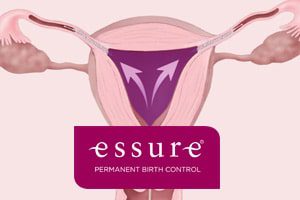
The Essure permanent birth control procedure has been marketed as convenient and quick with little down time, but has been tied to growing reports of adverse reactions. The outpatient Essure procedure is an irreversible, permanent form of birth control in which the woman remains conscious while a physician inserts a small camera through the cervix. […]
 The Essure permanent birth control procedure has been marketed as convenient and quick with little down time, but has been tied to growing reports of adverse reactions.
The Essure permanent birth control procedure has been marketed as convenient and quick with little down time, but has been tied to growing reports of adverse reactions.
The outpatient Essure procedure is an irreversible, permanent form of birth control in which the woman remains conscious while a physician inserts a small camera through the cervix. Tools are guided to the fallopian tools so that a tiny, coiled spring with a length of plastic fiber can be inserted. Once the instrument is withdrawn, the spring uncoils, allowing the fiber to cause an irritation that creates scar tissue, which blocks the fallopian tubes, according to The Daily Mail. A scan is performed three months later to ensure fallopian tubes are completely blocked.
The Essure was approved in the United States in 2002 and in Great Britain in 2009. In the U.S., reports of side effects such as debilitating headaches, nausea, allergic reactions to the device’s nickel components, and colon perforation due to device migration have been made, according to The Daily Mail.
Meanwhile, well-known consumer advocate, Erin Brockovich, is working in the U.S. to ban the Essure, telling ABCNews.com that, about one year ago, she began hearing about women reporting serious adverse reactions associated with the sterilization procedure. “There’s something wrong with the device, in my opinion,” Brockovich said. “It’s a form of permanent birth control, and women’s organs are being perforated…. It’s ridiculous that at any level we try to defend this. If 30 women did suffer harm for unknown reason, we’d investigate. We have thousands injured. I don’t think it’s safe,” she added, according to ABCNews.com. In the U.K., women are beginning to complain of complications and side effects tied to the Essure.
“ should care about the health and welfare of all people,” Brockovich told ABCNews.com. “Especially women and children in this country. If this many are reporting injuries, take it off the market. It’s not working. These women were misled. They feel they were scammed.” According to the original designer and maker of Essure, Conceptus, more than 700,000 women have undergone the procedure. More than 800 women have filed adverse event reports with the FDA since 2004, ABCNews.com reported.
Dr. Jennifer Ashton, senior health contributor for ABC News underwent Essure procedure training in 2002. Dr. Ashton says she does not to perform the procedure on her patients. “Whenever there is the permanent placement of a foreign body—in this case, metal coils—inside the body, there is the potential for chronic pain,” Ashton said. “Because Essure does not offer any known benefit towards risk reduction of ovarian cancer, as a tubal ligation does, I feel that other forms of permanent birth control are better and safer, including male vasectomy. Women considering permanent birth control should be offered all options including tubal ligation and male vasectomy, not only the procedure that a woman’s doctor is able to perform personally,” she added.
The Mayo Clinic website indicates that Essure procedure risks include infection, pelvic pain, perforation of the uterus or fallopian tubes, and tubal blockage occurring on only one side. Some patients make poor candidates and some procedures cannot be performed following the Essure procedure, including some pelvic electrosurgical procedures, due to the Essure inserts’ metallic components.


